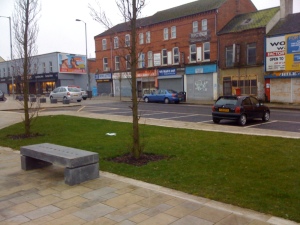All change
March 6, 2012 Leave a comment
New blogging continues at www.scrabopower.tumblr.com.
Thanks for reading!
Listen to your life, then write about it sometimes
March 6, 2012 Leave a comment
New blogging continues at www.scrabopower.tumblr.com.
Thanks for reading!
October 31, 2011 2 Comments
It’s been a long time since I visited this blog. A lot has happened since my last post in February 2011, although its mainly been the addition of a baby to the family and house move. Plus I think my attention span has suffered due to facebook and twitter to such an extent that writing a blog entry seems like so much….effort.
So it is from sunny Ballybeen that I write, having just put nine month old Linus to bed. We’ve moved from an area (lower Woodstock) where too many people asked “will the car be alright?” when they visited, to another neighbourhood where people coming in still make assumptions about the area.
I think I have some plans for this blog. Maybe to try out characters I’ve been developing for some short stories, sketch ideas for talks in church..not sure. In the meantime, here is a picture of my dog after his bath this evening.

February 21, 2011 Leave a comment
It’s been interesting to see new churches being planted in the Belfast area over the last few years, of all shapes/sizes with various theological emphases (albeit still broadly similar). Any leaders that I have met recently tend to come from creative or graphic-design based backgrounds, and are still working in those high-tech, constantly changing professions. This background also comes through in the style and presentation of those church projects.
Why is it then that Christians from a community development background are not planting churches?
(I make the distinction here from clergy, some of whom I know, who carry out their ministry very much with a CD ethos).
The relationship and congregational aspects of church life seem to me to fit with the strengths of community development principles, and people from this background are perhaps better suited to the rough and tumble of dealing with personalities in church. Furthermore, the CD focus on people rather than buildings and institutions I believe fits in with biblical principles.
I could think of a few possible reasons why they are not planting churches:
Thinking out loud here, and with no answers or quick fixes myself. I just sit with church people sometimes and think to myself..you’re very enthusiastic and all, I don’t doubt your intentions but…what you want to do achieve might take a loooong time. Perhaps too long for most churches to commit to.
February 21, 2011 Leave a comment
 I cycle past this stretch of road almost every day. Typical of some of bad planning round these parts. We have some expensively assembled footpaths, trees planted, and benches..all remaining totally unvisited. At the same time these walkways stretch out alongside rows of derelict buildings and vacant business units. There’s another public space round the corner, the junction where Castlereagh road meets Templemore Avenue and the Ravenhill Road…there’s some seating and pretty paving right in the middle of the junction, like a traffic island. And now both these new developments look increasingly sorry for themselves – its not from over-use. There are probably numerous examples near where you live.
I cycle past this stretch of road almost every day. Typical of some of bad planning round these parts. We have some expensively assembled footpaths, trees planted, and benches..all remaining totally unvisited. At the same time these walkways stretch out alongside rows of derelict buildings and vacant business units. There’s another public space round the corner, the junction where Castlereagh road meets Templemore Avenue and the Ravenhill Road…there’s some seating and pretty paving right in the middle of the junction, like a traffic island. And now both these new developments look increasingly sorry for themselves – its not from over-use. There are probably numerous examples near where you live.
Why are so bad here at creating public spaces? Money has been squandered on these projects from Government budgets whose enforced cuts will affect us all.
James Kunstler on ted.com delivers a great lecture on suburbia and civic life in cities, pointing out how the US is particularly bad at this, and gives other examples of healthy civic spaces in countries like France. He argues we have created too many public spaces that we don’t think are worth caring.
January 25, 2011 1 Comment
 I am not an apologist for the words of Andy Gray and Richard Keys, but it seems that Gray’s dismissal was unusually swift. I wonder how much of this was down to the public “outcry” over what was said, or down to the Sky Empire’s desire to be seen to have a softer side as the proposed buyout from Murdoch gathers pace.
I am not an apologist for the words of Andy Gray and Richard Keys, but it seems that Gray’s dismissal was unusually swift. I wonder how much of this was down to the public “outcry” over what was said, or down to the Sky Empire’s desire to be seen to have a softer side as the proposed buyout from Murdoch gathers pace.
Recently we have seen a number of unpopular policy decisions suggested and then acted upon by our politicians:
-the bailout of the banks
– the cuts agenda
-the rise in tuition fees
..as well as other actions which have been out of the hands of the public such as the award of sky-high bankers bonuses this month. All of these measures have seen massive public demonstrations and protests, but they’ve led to no changes in policy so far. It’s all been allowed to just happen.
Because of this failure by the public to influence and change Government policy…are we now switching our attention to everything said and done by public figures as a way of venting this frustration and anger? I don’t think it’s too much of a leap to make. Major names in the BBC, figures in the world of sport, Daily Mail columnists, women who put cats in bins, and politicians’ private lives have all been the subject of media campaigns of some sort…usually ending with a resignation or apology. And you could say this triviality then distracts our attention from more serious news.
January 12, 2011 Leave a comment
 Colin Firth has captured the mixture of anxiety, frustration, fear, and shame faced by stammerers superbly in this film. You can see the dread in the lines of his face as Bertie coldly looks at the microphone in the film’s opening sequence at Wembley stadium. I am so glad that stammering has been portrayed in this film not as a joke but as a serious impediment. Some of the scenes were truly painful to watch..a feeling shared by many other stammerers who have seen the film I’m sure.
Colin Firth has captured the mixture of anxiety, frustration, fear, and shame faced by stammerers superbly in this film. You can see the dread in the lines of his face as Bertie coldly looks at the microphone in the film’s opening sequence at Wembley stadium. I am so glad that stammering has been portrayed in this film not as a joke but as a serious impediment. Some of the scenes were truly painful to watch..a feeling shared by many other stammerers who have seen the film I’m sure.
Stammering is not talked about much in the public sphere…because well, that would involve talking! It’s been fantastic to hear radio phone-ins and TV features focussing on the issue as a result of this film. However The King’s Speech is much more than a single-issue vehicle. The script, and particularly the cast are sublime in every frame. I got the feeling the cast relished playing such well-known characters.
There was a great deal of humour in the relationship between the Australian actor Logue and the King, as techniques were taught to manage his stammer (another strength of the story was that he was never “cured”). Over time I have incorporated more ticks, tricks, and runs to the way I talk in order to get certain words out than I probably even realise now, and it was reassuring to see some of those (at times toe-curlingly embarrassing!) methods being tried out here.
The stammer I have grown up with has been a serious challenge to my confidence, especially in public, but many others have it far far worse. I hope that The King’s Speech, and the accolades it will doubtless receive this year, can increase understanding and awareness of stammering, to treat it as more than just a quirky joke.
January 12, 2011 Leave a comment
As it seems to be open season in the media for challenging Christianity (not a bad thing I hasten to add), I was intrigued by Of Gods and Men and the critical praise it had received. Saw it last week at the QFT and came away with plenty to think about. It is the true story of a monastery of Trappist monks in Algeria in the mid nineties. They continue to minister to the local villagers in simple, practical ways…even while under violent threat from Islamist terrorists, and an insecure corrupt Government. The film follows the monks’ daily routines slowly and painstakingly, following each members’ journey towards making the decision whether or not to flee the region.
Peace is genuinely never given a chance
The leader of the Monastery challenges the leader of an armed gang in a tense encounter on Christmas Eve, calling into question their language and behaviour. There is no retaliation from the gang…just a stunned, albeit uneasy, truce, which results in the Monastery and village being left in peace.
In places of worship are we scared of each other’s voices?
Central to the film is the wonderful music. When I say music there is no score, just the daily chanting of the Monks as they carry out their duties. I believe there is comforting, reassuring beauty and solidarity in being surrounded by other voices in unison. There was no individual beauty in their voices..but there was such feeling there. In our mainstream Evangelical culture we have chosen to drown singing out with trend-chasing rock band arrangements. If the bombs come…we can’t wait for the band to kick in first.
Joy is found and wisdom revealed in the everyday
The monks each came to their decision while undertaking life’s daily grind. This was one of the most un-“Hollywood” films I have seen. It unfolded at its own pace, with very limited dialogue, as God seemed to reveal himself through the mundane details of every day.
It’s worth trying to catch this in the cinema, where you can let its rhythm and mood fully draw you in. A masterpiece.
September 28, 2010 Leave a comment
Listening to Nicky Campbell on Five Live this morning just before 7am, Stuart Elliott the former Hull City player and NI international was being interviewed about his decision to quit football and become a Pastor.
It’s quite well known over here that Stuart Elliott is very open about his Christian faith, yet as he explained his reasons for becoming a Minister, and gave his opinion on a few different issues including why the Pope’s beliefs are not shared by him it became more and more cringeworthy to me. I felt a bit ashamed of myself.
Stuart wasn’t expressing views that surprised me. In fact, I agreed with most of it – but listening to him felt embarrassing. Perhaps it was the starkness of what he was talking about – no embellishments, no illustrations, just a simple articulation of what he believed.
I wouldn’t say it offended me, but definitely stirred a strong reaction, maybe almost the sort of reaction someone strongly opposed to Christianity might have, which shocked me a bit.
Over the years I’ve developed a nostalgic affinity with the old road signs, smart-alec slogans, sandwich boards, and megaphone men that are still around – rather than regarding them as constant reminders of why I am here and what I must do.
Perhaps the reality of the gospel and the Kingdom of God is closer to us than any billboard or radio soundbite.
Maybe it is so much under the skin of those who believe, or believe there is something else…a desire so close to us that it makes traditional gospel methods at times seem alien and intrusive.
I’m thankful for men like Stuart Elliott who stand up for their beliefs in the way they do, but also the anytime/anywhere nature of the Holy spirit, reminding us that the Kingdom of God is at hand.
I hope being embarrassed at the radio this morning was positive thing. A reminder that the gospel message is relevant and speaks to a deeper longing.
September 23, 2010 Leave a comment
I was down the Newtownards Road tonight for a community discussion on the history of Ballymacarrett in East Belfast. There were many rich, funny, poignant, and shocking stories shared by those present about the area’s heritage. Van Morrison was mentioned a few times as an East Belfast man who referenced the area in some of his songs. During the evening I kept thinking back to the American singer-songwriters I love, and how they have romanticised their hometowns to such an extent that millions of people travel to these places as a result. How are American artists so much better at this?
Twice in the past 18 months I’ve travelled across the New Jersey Turnpike on the East Coast of the US – referenced in so many popular songs by performers such as Simon & Garfunkel and Bruce Springsteen. Stopping at a service area it felt like just another road, and a badly pot-holed one too! I think the Newtownards Road could hold just as much mystique if done the right way. Some novelists have managed it with Northern Ireland as a setting, maybe its time for musicians.
There’s a Dr Feelgood video at the top of the page because I watched a brilliant documentary about them on the BBC iPlayer last week called Oil City Confidential. It’s everything a rock documentary should be – fast-paced, gives a social context, doesn’t take its subject matter too seriously. Anyway, the members of the band talk at length about how, inspired by American blues music, they wanted to create a romantic image of their home town Canvey Island as the “Thames Delta” using the oil fields of the estuary as a backdrop. It worked, as fans of the band travelled there from all over the world based on the scene that they created.
What stories and places from where you live would make a great song? Scrabo would be a good one.
September 21, 2010 4 Comments
“The things that you mis-hear put yourself into it more”
I’ve misheard a lot of lyrics in The National’s High Violet album but just got used to singing them that way. Interesting to hear that Matt Berninger the main singer and songwriter mention at the beginning of this clip he actually hopes that will happen. It’s a curious point to make but a correct one – the songs with lyrics I can’t make out I do tend to play more, and then become more attached to them.